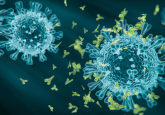Small but mighty: using nanotechnology to enhance disease detection

An Associate Professor from the University of Central Florida (UCF; FL, USA), Xiaohu Xia, has secured a US $1.3 million R01 grant from the National Institutes of Health (MD, USA). This funding will enable Xia to continue his research aiming to dramatically improve the sensitivity and accuracy of enzyme-linked immunosorbent assay (ELISA) tests in cancer and disease screenings using nanotechnology.
Transforming disease detection
Early detection of diseases like cancer and dementia is crucial for effective treatment and better patient outcomes. Xia’s innovative approach involves using nickel-platinum nanoparticles as artificial enzymes to improve ELISA testing, which is widely used in medical diagnostics.
“In our preliminary laboratory results, we have demonstrated that our nanoparticle-based artificial enzymes are able to improve the detection sensitivity by about 300 times better than the current assets in the market,” Xia explained.
The research and its impact
Over the next 4 years, Xia’s research will focus on enhancing the diagnostic power of ELISA tests by employing these specially designed nanoparticles. The nanoparticles are engineered to bind with specific disease biomarkers found in bodily fluids, producing a visible color when bound. This enhanced sensitivity could potentially transform early disease detection while providing more precise results by reducing false negatives.
You may also be interested in:
- Overcoming matrix interference: ADA immunoassays using an automated nanoliter platform
- DNA barcoding and nanopore sequencing could aid heart disease and cancer testing
- Beckman Coulter Life Sciences launch CytoFLEX nano flow cytometer
“ELISA technology is one of the most popular technologies used for screenings of a variety of different diseases,” Xia stated. “In our technology, we’re going to replace the natural enzyme with our artificial enzymes, which are made of metal nanoparticles. The artificial enzymes are much more efficient than natural enzymes so that means we’re going to have a stronger color signal, which can substantially improve the detection sensitivity of this technology.”
A new frontier in diagnostics
This research marks the first time Xia’s nanoparticles will be tested with clinical samples. By targeting early-stage prostate and colorectal cancers in human blood samples, Xia aims to demonstrate the efficacy of this technology in a real-world clinical setting.
“Detection sensitivity is critical for diagnostics for significant diseases,” Xia emphasized. “For the very early stages, the concentration of biomarkers may be very low and not detected by conventional ELISA. With our new technology, we’re aiming to substantially improve the sensitivity so we can detect even low concentrations of biomarkers in patient samples.”
“The ultimate goal we want to achieve is early detection of significant diseases like cancer and in the future, we also want to detect some other very challenging diseases like maybe even Alzheimer’s Disease,” Xia explained.




